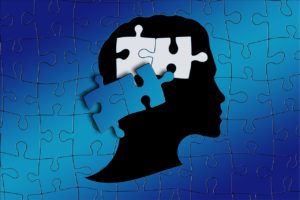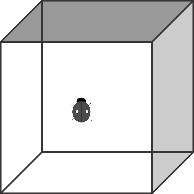LD

Do you want to know how to teach LD students music? The archive contains posts about teaching LD students music.
Learning Differences vs Learning Disabilities
Some people say that the acronym LD means Learning Disabilities, while others say that it means Learning Differences.
Both terms have some relevancy. Students with LD usually have average or above average intelligence. However, they have areas where they struggle to learn. Thus, why some call LD learning disabilities, because of the difficulty with learning.
Nevertheless, a case has been made that students with LD learn in an essentially different way. Thus, why some call LD learning differences. This is the view taken in The Successful Music Student blogs.
A Learning Difference that Can Turn into a Learning Disability
Having a strong visual-spatial aptitude is linked to both learning disabilities and to talent in music, art, and math.
Look at the bug on the cube below. Which surface does the bug rest on? Front or back?

Did you see the cube flip back and forth? This illusion is called an unstable object. The mind needs more information to resolve the picture. As a result, your brain keeps switching how it sees the cube.
People with LD perceive something similar to this illusion as they see letters, numbers, and musical symbols move around on the page.
Since many people with LD have strong visual-spatial abilities, they are more prone to these types of optical illusions. Therefore, a learning difference can turn into a learning disability.
Intuitive, creative, original thinkers, visual-spatial learners have often had an impact on science, the arts, and sports.
However, when it comes to interpreting abstract symbols, strong spatial abilities can cause problems. The good news? Multisensory teaching can help the LD student learn effectively.
© 2021 Geoffrey Keith
Back to the Successful Music Student Blogs page





![Prodigy Meaning (Examples of Special Talent in Music) [Video] - Children Playing Music - Sing the Charming Song London Bridge Is Falling Down](https://successmusicstudio.com/wp-content/uploads/2024/05/Prodigy-Meaning-Examples-of-Special-Talent-in-Music-Video-Children-Playing-Music-1024x682.jpg)




![Amnesia, Alzheimer’s, Stroke, and Color Coding Music - Elderly Accordion Player - Perfect Pitch: Discover the Truth [Plus Absolute Pitch Test]](https://successmusicstudio.com/wp-content/uploads/2024/01/Amnesia-Alzheimers-Stroke-and-Color-Coding-Music-Elderly-Accordion-Player-1024x1024.jpg)

